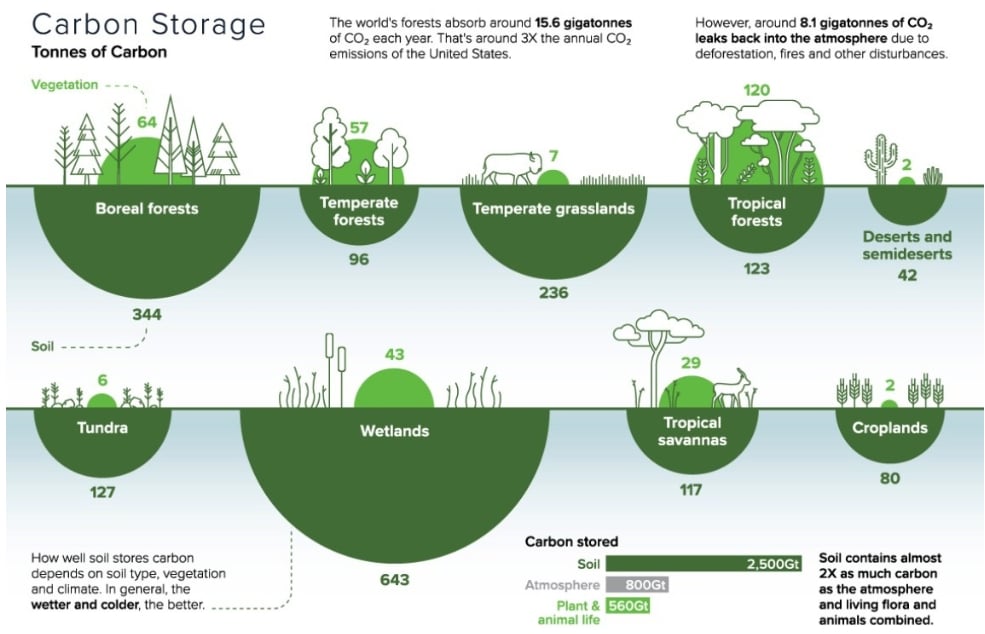May 30, 2025 | 23:44 GMT +7
May 30, 2025 | 23:44 GMT +7
Hotline: 0913.378.918
May 30, 2025 | 23:44 GMT +7
Hotline: 0913.378.918

Soil is an untapped storage solution. Image: Visual Capitalist
Brown stuff that sticks to your shoes might seem an unlikely hero in the story of our fight against the climate crisis. But mud and soil are currently being tipped for starring roles as scientists seek ways to capture more carbon.
Simple techniques to improve soil quality could help us reach our climate targets, scientists say.
Crop rotation, planting cover crops and using direct drilling could store around 31 gigatonnes of carbon dioxide annually, according to land management company, Downforce Technologies.
And that would make a sizable impact since it is close to the 32 gigatonnes gap that exists between planned emissions reduction globally per year, and the amount of carbon that must be cut by 2030 to stay within 1.5C global heating, Downforce’s Chief Scientist, Jacqueline McGlade told The Guardian.
The calculations underscore the vital part soil plays. Yet 33% of soil is already degraded around the world, reports the UN. More carbon resides in soil than in the atmosphere and all plant life put together, research shows.
A recent study has found that more than half of Earth's species live in the soil, with the study finding it was the world's most biodiverse habitat.
The importance of healthy soil around the world was the focus of a panel chaired by Tania Strauss, the World Economic Forum’s Head of Food and Water, at the Forum’s 14th Annual Meeting of the New Champions (AMNC) in Tianjin, People’s Republic of China.
Science, technology and nature can come together to help restore soils, the panellists said.
“Soil is like a bank account,” said Ole Kristian Sivertsen, Chief Executive Officer at Desert Control, an innovative Uplink company that harnesses AgTech to combat soil degradation.
Restoring soils that are currently degraded has the potential to store much more carbon, Sivertsen said, but innovation is vital.
The Forum’s 100 Million Farmers programme is a multi-stakeholder platform promoting action on farms to underpin the transition to net-zero food systems by 2030.
Access to technology and smart farming tools forms a large plank of the strategy for smallholder farms, Doris Yu, Senior Vice-President at Yara International, told AMNC.
Better soil has huge potential to help mitigate the climate crisis, and it’s currently untapped, said Fan Shenggen, Chair Professor, China Agricultural University, at the same event.
“Without soil, there would be no human beings,” Shenggen said. “That’s the importance of soil.”
(The Guardian)

(VAN) Vikas Rambal has quietly built a $5 billion business empire in manufacturing, property and solar, and catapulted onto the Rich List.

(VAN) Available cropland now at less than five percent, according to latest geospatial assessment from FAO and UNOSAT.

(VAN) Alt Carbon has raised $12 million in a seed round as it plans to scale its carbon dioxide removal work in the South Asian nation.

(VAN) Attempts to bring down the price of the Japanese staple have had little effect amid a cost-of-living crisis.

(VAN) Fourth most important food crop in peril as Latin America and Caribbean suffer from slow-onset climate disaster.

(VAN) Shifting market dynamics and the noise around new legislation has propelled Trouw Nutrition’s research around early life nutrition in poultry. Today, it continues to be a key area of research.

(VAN) India is concerned about its food security and the livelihoods of its farmers if more US food imports are allowed.